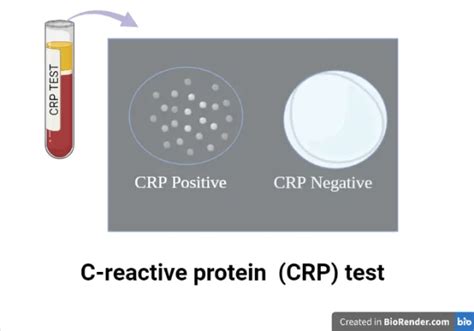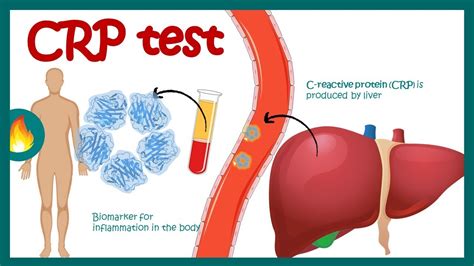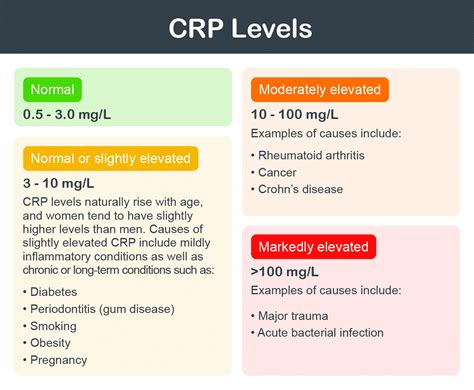Intro
Discover 5 crucial CRP test facts, including C-Reactive Proteins role in inflammation, blood test procedures, and correlations with cardiovascular disease, arthritis, and infection risks, to understand its significance in medical diagnosis and treatment.
The C-Reactive Protein (CRP) test is a widely used diagnostic tool that measures the level of C-Reactive Protein in the blood, which is a protein produced by the liver in response to inflammation. Inflammation is a natural response of the body's immune system to injury or infection, and CRP levels can rise significantly in response to acute or chronic inflammation. Understanding the CRP test and its implications is crucial for both healthcare professionals and individuals seeking to monitor their health. Here, we delve into the importance of the CRP test, its applications, and what the results might indicate about an individual's health status.
Inflammation is a complex biological response that involves various cellular and molecular mechanisms. It can be acute, such as in the case of an injury, or chronic, as seen in conditions like arthritis or cardiovascular disease. The CRP test is particularly useful because it can help differentiate between acute and chronic conditions, guide treatment decisions, and monitor the effectiveness of therapeutic interventions. For instance, high sensitivity CRP (hs-CRP) tests can detect even slightly elevated levels of CRP, which is beneficial for assessing the risk of cardiovascular events.
The CRP test has become an indispensable tool in clinical practice due to its simplicity, speed, and the wealth of information it provides about the inflammatory status of a patient. It is commonly used in the diagnosis and monitoring of infections, inflammatory diseases, and cardiovascular risk assessment. Moreover, CRP levels can be influenced by various factors, including lifestyle choices, such as diet and exercise, and environmental exposures. This underscores the importance of considering CRP test results in the context of a comprehensive medical evaluation.
Understanding CRP Test Results

Interpreting CRP test results requires a thorough understanding of the reference ranges and the clinical context in which the test was performed. Generally, CRP levels are considered to be within the normal range if they are below 10 mg/L, though this can vary slightly depending on the laboratory. Elevated CRP levels can indicate the presence of an inflammatory process, but they do not specify the cause or location of the inflammation. For example, significantly elevated CRP levels might be seen in severe infections, autoimmune diseases, or following surgical procedures.
Factors Influencing CRP Levels
Several factors can influence CRP levels, including age, smoking status, obesity, and certain medications. For instance, statins, which are commonly prescribed to lower cholesterol, can also reduce CRP levels. Understanding these factors is crucial for accurately interpreting CRP test results and making informed decisions about patient care.Applications of the CRP Test

The CRP test has a wide range of applications in clinical practice. It is used in the diagnosis and monitoring of conditions such as rheumatoid arthritis, where chronic inflammation is a hallmark of the disease. The test can also help in assessing the risk of cardiovascular disease, as elevated CRP levels have been associated with an increased risk of myocardial infarction and stroke. Furthermore, CRP levels can be used to monitor the response to treatment in patients with infections or inflammatory conditions, helping to guide adjustments in therapy.
Limitations of the CRP Test
While the CRP test is a valuable diagnostic tool, it also has its limitations. For example, CRP levels can be elevated in response to any inflammatory stimulus, making it nonspecific. Additionally, some individuals may have chronically elevated CRP levels due to underlying health conditions, which can make it challenging to interpret test results. Therefore, the CRP test should always be used in conjunction with other diagnostic tests and a thorough clinical evaluation.CRP Test and Lifestyle Modifications

Lifestyle modifications can significantly impact CRP levels. For instance, adopting a healthy diet rich in fruits, vegetables, and whole grains, and low in processed and saturated fats, can help reduce inflammation. Regular physical activity, not smoking, and maintaining a healthy weight are also associated with lower CRP levels. These lifestyle changes not only reduce the risk of chronic diseases but also contribute to overall well-being.
Statins and CRP Reduction
Statins, beyond their cholesterol-lowering effects, have been shown to reduce CRP levels, which may contribute to their anti-inflammatory properties. This reduction in CRP is associated with a decreased risk of cardiovascular events, highlighting the potential benefits of statin therapy in patients with elevated CRP levels.CRP Test in Pregnancy

During pregnancy, the CRP test can be useful in monitoring for potential complications such as preterm labor or infections. Elevated CRP levels in pregnant women can indicate an increased risk of these complications, allowing for early intervention. However, it's essential to interpret CRP results in the context of pregnancy, as physiological changes during pregnancy can affect CRP levels.
Pregnancy-Related Conditions and CRP
Certain pregnancy-related conditions, such as preeclampsia, can be associated with elevated CRP levels. Monitoring CRP in these cases can help in the early detection and management of the condition, potentially improving outcomes for both the mother and the baby.CRP Test and Mental Health

There is a growing body of evidence linking chronic inflammation, as indicated by elevated CRP levels, with an increased risk of mental health disorders such as depression and anxiety. The CRP test can be a useful tool in assessing the inflammatory status of individuals with mental health conditions, potentially guiding treatment strategies that address both the psychological and physiological aspects of these disorders.
Inflammation and Depression
The relationship between inflammation and depression is complex and bidirectional. Elevated CRP levels have been found in individuals with depression, and reducing inflammation through lifestyle modifications or pharmacological interventions may have a beneficial effect on depressive symptoms.CRP Test in Children

In pediatric medicine, the CRP test is used to diagnose and monitor conditions such as bacterial infections, where it can help differentiate between viral and bacterial causes. Elevated CRP levels in children can also indicate the presence of an inflammatory condition, such as juvenile idiopathic arthritis.
Interpreting CRP in Pediatric Patients
Interpreting CRP results in children requires consideration of age-specific reference ranges, as CRP levels can vary significantly with age. Additionally, the clinical context, including the presence of symptoms and other diagnostic findings, is crucial for making accurate diagnoses and treatment decisions.What does a high CRP level indicate?
+A high CRP level indicates the presence of inflammation in the body, which could be due to an infection, an autoimmune disease, or another inflammatory condition.
Can lifestyle changes reduce CRP levels?
+Is the CRP test specific for any particular disease?
+The CRP test is not specific for any particular disease but rather indicates the presence of inflammation. It is used in conjunction with other diagnostic tests and clinical evaluation to determine the underlying cause of elevated CRP levels.
In conclusion, the CRP test is a valuable diagnostic tool that provides insights into the inflammatory status of an individual. By understanding what CRP levels indicate and how they can be influenced by various factors, including lifestyle modifications, healthcare professionals can make more informed decisions about patient care. As research continues to uncover the complex relationships between inflammation, lifestyle, and disease, the role of the CRP test in preventive medicine and personalized healthcare is likely to expand. We invite readers to share their thoughts on the importance of the CRP test in clinical practice and how it has impacted their understanding of inflammation and health.
